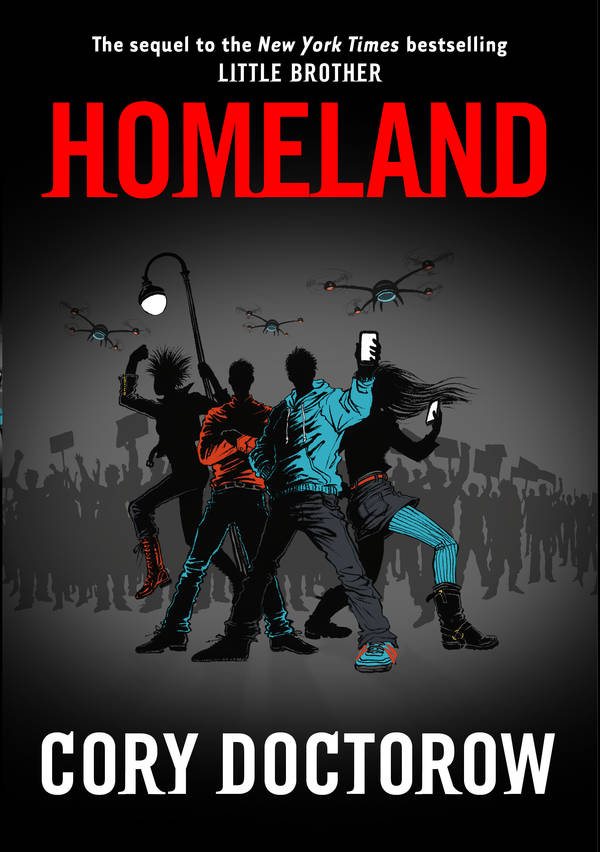
A former activist himself, Cory Doctorow was named one of the Web’s twenty-five ‘influencers’ by Forbes magazine and a Young Global Leader by the World Economic Forum. He is following up his potboiler bestseller LITTLE BROTHER with HOMELAND, an admirable and plenty suspenseful sequel digging deeper into the unrest of our times.
YOUNG ADULT: Tell us a little bit about your latest work. What is different about HOMELAND?
Cory Doctorow: HOMELAND is the sequel to my YA novel LITTLE BROTHER. Like LB, it’s the story of tech-savvy kids fighting oppression and injustice. Unlike LB, the injustice here doesn’t take any easy-to-point-at form, rather, it’s an invisible web of behind-the-scenes corruption fed by greed, secrecy and venality.
YA: Take us through a typical writing day for you.
CD: It’s entirely project-based. HOMELAND was conceived of in October 2011 and was due in December 2011, which meant I had to write ~2000 words every day to meet the deadline. So I did. I was touring in Germany and Switzerland with FOR THE WIN while doing a lot of this work, and I would basically have my head down on my laptop every moment I wasn’t presenting to kids or talking to the press — while eating, in taxis and on trains, from the moment I got up to the moment I dropped.
YA: Can you describe the path to getting this work published? What were the challenges? What was easy about it?
CD: I sat down for dinner in early October 2011 with my agent in NYC. I’d been attending a conference there. I told him I’d had an idea for a sequel to LITTLE BROTHER, something I’d never thought I’d do. His eyes lit up. He sold it two days later. Then I had to write it!
From the Book:

YA: What were your specific influences for this book? Films, literature, other stories?
CD: Graeber’s amazing book DEBT; the Wikileaks saga, UC Irvine’s special one-shot journal on student debt, Hudson’s book THE MONSTER (about the subprime meltdown), Wikileaks data-dumps (especially HB Gary), my experiences at the Occupy camps, Scahill’s “Blackwater: The Rise of the World’s Most Powerful Mercenary Army” and many others.
YA: With a tyrannical security state and ‘hacktivists’, HOMELAND seems just a step ahead of our current times. Where do you see the sub genre of dystopian futuristic young adult fiction going next?
CD: I hope that we’ll see some kind of effective kids’ movement for digital freedom. As Aaron Swartz wrote in his afterword to HOMELAND: ‘I know it’s easy to feel like you’re powerless, like there’s nothing you can do to slow down or stop “the system.” Like all the calls are made by shadowy and powerful forces far outside your control I feel that way, too, sometimes. But it just isn’t true.’
YA: If you hadn’t become an author, what path would your career have perhaps taken?
CD: I’d have probably stayed at the Electronic Frontier Foundation as a full-time activist.
* *
—

“Marcus Yallow was arbitrarily detained and brutalized by the government in the wake of a terrorist attack on San Francisco—an experience that led him to become a leader of the whole movement of technologically clued-in teenagers, fighting back against the tyrannical security state.
A few years later, California’s economy collapses, but Marcus’s hacktivist past lands him a job as webmaster for a crusading politician who promises reform. Soon his onetime girlfriend Masha emerges from the political underground to gift him with a thumbdrive containing a Wikileaks-style cable-dump of hard evidence of corporate and governmental perfidy. It’s incendiary stuff—and if Masha goes missing, Marcus is supposed to release it to the world. Then Marcus sees Masha being kidnapped by the same government agents who detained and tortured Marcus years earlier.
Marcus can leak the archive Masha gave him—but he can’t admit to being the leaker, because that will cost his employer the election. He’s surrounded by friends who remember what he did a few years ago and regard him as a hacker hero. He can’t even attend a demonstration without being dragged onstage and handed a mike. He’s not at all sure that just dumping the archive onto the Internet, before he’s gone through its millions of words, is the right thing to do.
Meanwhile, people are beginning to shadow him, people who look like they’re used to inflicting pain until they get the answers they want. “
Cory Doctorow
http://www.craphound.com
latest novel: Pirate Cinema craphound.com/pc
latest essays: Context craphound.com/context
latest short story collection: With a Little Help craphound.com/walh
Join my mailing list and find out about upcoming books, stories, articles and appearances:
http://www.ctyme.com/mailman/listinfo/doctorow